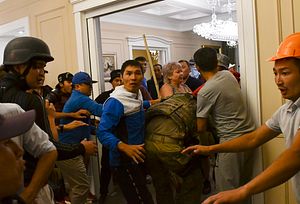Kyrgyzstan’s political crisis slipped into a second day on August 8, with government forces moving once again to detain former President Almazbek Atambayev. As of writing, Interfax is reporting that the former president has been detained after a second raid, echoed by local media outlets stating the former president has surrendered.
On Wednesday evening, Kyrgyz special forces attempted to detain Atambayev, who has been ignoring multiple subpoenas from the Interior Ministry. The raid went poorly, with the former president’s supporters rushing to his defense. The State National Security Committee (SCNS or GKNB) released a statement saying that its forces were equipped with rubber bullets, but Atambayev’s supporters fired back with weapons of their own. The fighting left one dead from a gunshot wound — Usenbek Niyazbekov, a deputy commander of the SCNS special forces — and another senior police official in a coma. Eighty sustained injuries, according to Health Ministry officials. Atambayev’s supporters also took half a dozen special forces troops hostage, releasing them late in the day on August 8.
Kyrgyz President Sooronaby Jeenbekov returned early from vacation after the August 7 operation went off-kilter. At an extraordinary session of the National Security Council on August 8, Jeenbekov blamed Atambayev for the violence.
“By putting up fierce armed resistance to the investigative measures undertaken within the framework of the law, Almazbek Atambayev gravely trampled upon the constitution and laws of Kyrgyzstan,” Jeenbekov said. “If before yesterday Atambayev was summoned to investigation as a witness, now he will be treated as someone accused of committing a serious crime.”
Atambayev, in typical style, fired back in remarks of his own. “Yesterday they did not say they came to take me for questioning, they came like gangsters and started shooting at people. For one or two months I have been saying that I will use arms to protect myself if somebody dares to trespass upon my home. I have a pistol that I received as a gift and a rifle.”
Kyrgyz authorities have summoned Atambayev three times; Kyrgyz law permits the forcible detention of a person who refuses two subpoenas.
As events unfold, confusion reigns but already there are a few threads that — in the aftermath — will need to be examined.
First: Atambayev claims that the charges leveled against him, as well as the stripping of his ex-presidential immunity that permitted them to proceed, are illegitimate. He has said the case against him is the product of a corrupt judicial system beholden to the president. But it can’t be forgotten that Atambayev served as president from 2011 to 2017 and heartily supported Jeenbekov as his successor. The rift between them has its roots in the fact that Jeenbekov didn’t make room for Atambayev to keep his hands in power while out of office. The Kyrgyz justice system is deeply flawed, but it was flawed throughout Atambayev’s tenure too — his temper-tantrum at losing grip on power deeply undercuts whatever plaudits he received for peacefully ceding it after the 2017 election.
Second: The failure of the first raid is deeply embarrassing for the state. But why did the raid fail? It appears, at this point, that the special forces were trying to be sneaky and light-handed — blast in, nab Atambayev, leave. They clearly did not anticipate the resistance encountered but also — given the nature of the injuries reported — were avoiding the use of deadly force, for example by using rubber bullets over live ammunition. While the images of riotous crowds and police are chaotic and concerning, the authorities demonstrated a degree of restraint — choosing to retreat on Wednesday and try again on Thursday rather than loading their guns in the night and perpetrating a massacre.
Third: Atambayev’s late July jaunt to Moscow to chat with Ruissian President Vladimir Putin drew a lot of attention. Russian interference in Central Asian politics is often assumed as a given. But Putin’s comments urged stability and unity, specifically around the sitting president: “The country is in need of political stability and everyone should unite around the sitting president and help him in developing the state.” At the time Atambayev had his own interpretation of his conversation with Putin, but Jeenbekov had his own discussions with Moscow a few weeks earlier. If Russia’s overriding objective is a stable and compliant Bishkek, it has little incentive to stand with Atambayev over Jeenbekov.
Lastly, Bruce Pannier’s analysis earlier today is worth reading: “Both Sides Lose In The Battle Outside Bishkek.” With the death of a special forces member, surely Atambayev will face additional charges. As Pannier notes, Atambayev claimed in his August 8 remarks to be the one armed with guns. Those words will surely be used against him. But Jeenbekov and Kyrgyzstan will suffer too: The botched raid reflect poorly on the state security services and the entire fiasco has catapulted Kyrgyzstan into international headlines, “once again for the wrong reasons,” Pannier writes.
Atambayev reportedly has surrendered, through local media report that his followers are impeding the car bearing their leader in its path back to Bishkek.
Meanwhile, Kazakh Prime Minister Askar Mamin has arrived in Kyrgyzstan, flying into a seasonal airport near Tamchi on the shores of Lake Issyk-Kul. The prime ministers of the Eurasian Economic Union countries are scheduled to meet on August 9 in Cholpon-Ata.

































